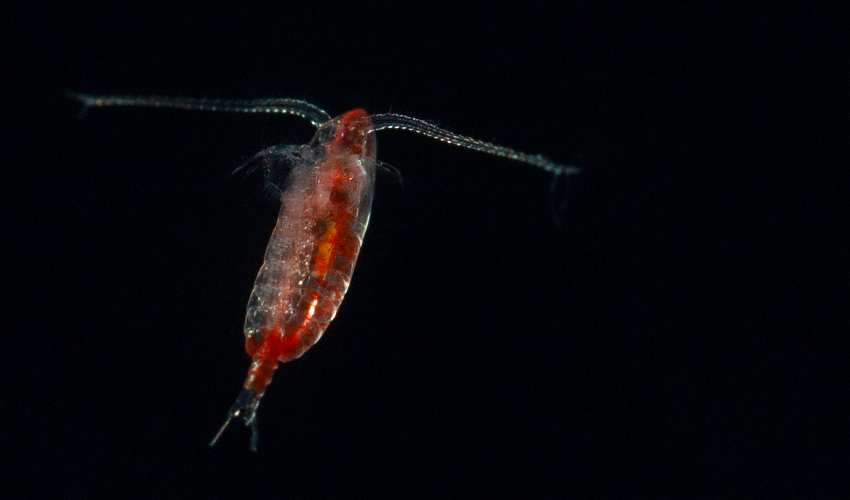Climate change may turn important marine organisms into ‘junk food’

A calanoid copepod, closely related to the species studied by San Francisco State University scientists (photo courtesy of Mike Stukel).
Study shows that predicted future ocean conditions make tiny algae, vital to ocean food webs, less nutritious
A new experiment by San Francisco State University scientists shows that the oceans of the future may make some types of microscopic algae poor eating for the creatures that feed on them, a shift that would have a big impact on fish and other marine animals we eat.
The study’s subject: tiny but important marine crustaceans called copepods. “They’re just everywhere. It’s hard to find a marine ecosystem where they’re not involved,” explained Morgan Meyers, who led the study as a master’s student at San Francisco State and is now pursuing her Ph.D. at the University of Otago in New Zealand. The crustaceans are a crucial link between the base of marine food webs — microscopic algae called phytoplankton — and bigger marine animals. “Copepods often fill that gap by consuming the phytoplankton. They in turn serve as prey to other organisms,” Meyers said.
That link, along with many other key pieces of ocean ecosystems, may be threatened by climate change. The same carbon dioxide that’s ratcheting up the Earth’s average temperature also finds its way into oceans, increasing the water’s acidity. This shifting ocean chemistry is harmful to many marine organisms, especially those that need to grow external shells that are prone to dissolving in more acidic water.
With the support of three faculty members from SF State’s Estuary & Ocean Science Center, Meyers caught around 100 of a common local copepod species and brought them into the lab, raising half in water meant to simulate the acidity of ocean waters in the year 2100 and the rest in water from today’s oceans. Also in the tanks was some of the copepods’ preferred food: four different species of phytoplankton.
Four days later, the researchers discovered, the phytoplankton grown in the more acidic water was already less nutritious than algae grown under current-day ocean conditions. Specifically, the algae in the altered water contained substantially lower proportions of essential fatty acids — important substances that all animals, from copepods to humans, are unable to make themselves and must obtain from their diet.
The copepods in the more acidic water laid 50% fewer eggs than their present-day counterparts, and the eggs they did lay rarely hatched. The team also repeated the experiment in water deficient in nitrate, an important form of the nutrient nitrogen found in the oceans, which lessened the effect. They published their research in the journal PLOS ONE on May 20.
Most research to date has suggested that copepods are likely to emerge from ocean acidification relatively unscathed. This study, however, highlights the possibility that turning their diet into junk food could have just as dire a consequence as harming them directly. “Copepods are an essential part of a larger ecosystem,” Meyers explained. “They’re not just serving their roles in isolation. They’re affected by the food they eat.” This isn’t the first scientific study to put copepods in a broader context, but previous work had a less realistic view of their diet, using only one species of microscopic algae as food.
The researchers say that harming such a key part of the marine food web may cause cascading effects, disrupting both marine ecosystems and the lives of people who rely on seafood as their main source of nutrition. But Meyers also notes that oceans are complicated systems that are difficult to forecast decades into the future.
“Because there are so many other variables that come into play with climate change, it’s hard to draw really solid conclusions from small experiments like this,” said Meyers. “But this is a starting point for getting more information about the broader implications for ecosystems.”
The study’s co-authors are SF State Research Professor of Biology William Cochlan, Professor of Biology Edward Carpenter and Research Professor of Biology Wim Kimmerer, all based at the EOS Center in Tiburon, California. Funding for the study was provided by the National Science Foundation (grant numbers 1131657 andPLR1246373) and the CSU Council on Ocean Affairs, Science & Technology.